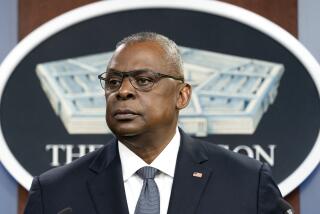Australia Outlines Long-Range Defense Strategy
- Share via
CANBERRA, Australia — Australia announced a long-range military strategy Thursday that reaffirms its alliance with the United States and their joint bases while reinforcing a commitment to neighboring countries.
Defense Minister Kim Beazley presented the long-awaited military white paper to Parliament, the first long-range policy statement on defense in more than a decade.
The strategy relies on aircraft, submarines, advanced radar and troop movements to block an attack from the north. It also recognizes the country’s problem of maintaining large standing armed forces with a largely uninhabited 12,500-mile coastline and a population of only 15.5 million.
Cooperation Emphasized
Beazley said the report for the first time offers Australia a workable policy of self-reliance, emphasizing the importance of defense cooperation with major allies--”the United States, New Zealand and our regional neighbors.”
Australia, the United States and New Zealand have been allies under the 36-year-old ANZUS treaty, severely strained last year by New Zealand’s refusal to allow U.S. warships into its ports if they are nuclear-powered or carrying nuclear weapons.
“The availability of American intelligence, advanced technology and logistic support makes a self-reliant defense capability for Australia achievable and affordable,” Beazley said.
In a major surprise, the government said it will keep army and air force units in Malaysia as part of a five-nation agreement that also includes Singapore, New Zealand and Britain.
A defense report last year called for an end to stationing Australian forces on foreign soil.
Thursday’s report reaffirms, however, the part of the 1986 assessment that said there is no regional power capable of mounting a major attack on Australia and that any threat will be “low level.” Critics of the earlier report argued that Indonesia could pose a major threat.
Beazley said the increasing presence of the Soviet Union in the Pacific is “of significant concern for Australian defense policy.”
“Its primary significance lies in the political influence it provides the Soviet Union (and) gives added importance to our defense cooperative activities in the region,” he said.
More to Read
Sign up for Essential California
The most important California stories and recommendations in your inbox every morning.
You may occasionally receive promotional content from the Los Angeles Times.










